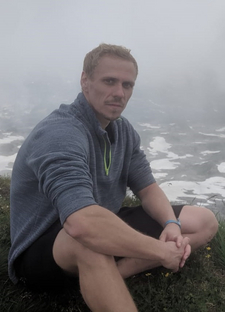Manuel Glass
Working Title: "Building Knowledge in Urban Agriculture Water Supply in São Paulo - The Context of Irrigation, Foodborne Pathogens and Antimicrobial Resistance"
Research Countries: Brazil
Research Themes: urban agriculture, water managemnet, AMR, foodborne disease, megacities
Biography:
Manuel moved to Cologne after secondary school and completed a three-year vocational training in nursing. (Intensive care nursing accompanied him throughout his career as a part-time job for more than 13 years.) Subsequently, he graduated from high school while working and then undertook a one-year European voluntary service in Ireland. After several stays in South America and Asia, he started to study physics at the University of Cologne. After graduating with a bachelor's degree in 2016, he took the opportunity to design his physics master studies to be more interdisciplinary (solid-state physics and bioelectronics as well as nano- and information technology). Furthermore, Manuel took courses at the Department of Chemistry and the Portuguese-Brazilian Institute. With the help of a scholarship from the German Academic Exchange Service, he was able to gain further experience abroad at the Department of Nuclear Energy (DEN) of the Universidade Federal de Pernambuco (UFPE) between 2017 and 2018, where he worked with Prof. Dr. Helen Jamil Khoury (DEN, UFPE). To continue pursuing complex and interdisciplinary research questions, he worked at the Research Center Jülich (FZJ) at the Institute of Biological Information Processing & Bioelectronics (IBI-3) in the group of Prof. Dr. Roger Wördenweber (IBI-3, FZJ) from 2018 to 2019. Based on this project work (guided growth of neuron cells on microchips) he holds a master’s degree in physics.
Last year Manuel established his external funded project at the Center for Developmental Research (ZEF) in collaboration with Prof. Dr. Christian Hoffmann (FoRC, USP) from the University in São Paulo (USP). Funded by the Konrad-Adenauer-Stiftung, he aims to add value for society through interdisciplinary research and active engagement, thus bring long-term added contribution to the holistic perspective of ´One Health`. He is a member of the German Alliance for Global Health Research (GLOHRA).
Abstract:
From political as well as from scientific view, cities are seen as places where many present and future problems are not only substantially caused, but also need to be solved. Urbanization is associated with increasing urban poverty, polluted environments, and growing food insecurity in many developing countries. Urban agriculture is an applied practice to improve local economies, health conditions, and food supplies (WHO 2016). But innovative global action is needed to ensure sustainable food systems and provide the growing urban population with access to affordable and clean food.
Research Question:The World Health Organization estimates that unsafe food causes 600 million cases of foodborne diseases and 420 000 deaths each year. More than half of these disease cases are due to inadequate sanitation, poor hygiene, and unclean water supply/irrigation (WHO 2016). Additionally, the serious increase of antimicrobial resistant pathogens in the urban food sector threatens global health with dramatic consequences for animals, humans and the environment (Van Boeckel, et al 2019). São Paulo, as one of the world's largest metropolitan areas (12 million, IBGE 2017), is the urban reference to research concepts and implement solutions. In this context, the following research question will guide my work:
- How can sustainable irrigation water management improve the safety of urban agriculture to contribute to health improvements? Specifically, can irrigation water management diminish foodborne diseases and reduce the occurrence of antimicrobial resistance?
Methodology: In a globally connected world, it is even more necessary to face problems holistically and understand the interactions between environmental, agricultural and human health. Thus, my work will be embedded in the ´One Health` concept. Therefore, my proposed research applies a mixed method approach, combining scientific problem-solving strategies with social science maxims, in a comparative case-control study. Exchange of inter/transdisciplinary knowledge will play a crucial role to link findings and realize sustainable implementations that answer my research question. A questionnaire will be used to collect and analyze socio-demographic as well as research-relevant data in 200 farms in São Paulo. In addition, water and food samples will be taken in the field for biological and chemical evaluations. To identify hygienic risk factors, pathogen contamination will be determined using standard microbiological methods. With regards to genetic characterization the most prominent pathogens are tracked along the food chain using next-generation DNA sequencing.
Relevance: Knowledge of contamination mechanisms in the urban irrigation system and on food will aim to develop evidence-based guidelines as well as specific hygienic recommendations and are essential for disease prevention. Recommendations from São Paulo could be set in the context of other metropolitan regions, such as the Rhine-Ruhr region (10 million, IKM 2016), and thus improve animal, human, and environmental health across borders.
Further links:
Supervisor(s):
Prof. Christian Borgemeister (ZEF)
Prof. Christian Hoffmann (USP - FoRC)
Funded by Konrad-Adenauer-Stiftung




